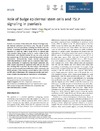Identificador persistente para citar o vincular este elemento:
https://accedacris.ulpgc.es/jspui/handle/10553/70070
| Título: | Role of bulge epidermal stem cells and TSLP signaling in psoriasis | Autores/as: | Gago-Lopez, Nuria Mellor, Liliana F. Megías, Diego Martín-Serrano, Guillermo Izeta, Ander Jimenez, Francisco Wagner, Erwin F. |
Clasificación UNESCO: | 320106 Dermatología | Palabras clave: | Epidermal Hyper-Proliferation Hair Follicle Stem Cells Lineage Tracing Psoriasis Thymic Stromal Lymphopoietin |
Fecha de publicación: | 2019 | Publicación seriada: | EMBO Molecular Medicine | Resumen: | Psoriasis is a common inflammatory skin disease involving a cross-talk between epidermal and immune cells. The role of specific epidermal stem cell populations, including hair follicle stem cells (HF-SCs) in psoriasis is not well defined. Here, we show reduced expression of c-JUN and JUNB in bulge HF-SCs in patients with scalp psoriasis. Using lineage tracing in mouse models of skin inflammation with inducible deletion of c-Jun and JunB, we found that mutant bulge HF-SCs initiate epidermal hyperplasia and skin inflammation. Mechanistically, thymic stromal lymphopoietin (TSLP) was identified in mutant cells as a paracrine factor stimulating proliferation of neighboring non-mutant epidermal cells, while mutant inter-follicular epidermal (IFE) cells are lost over time. Blocking TSLP in psoriasis-like mice reduced skin inflammation and decreased epidermal proliferation, VEGF alpha expression, and STAT5 activation. These findings unravel distinct roles of HF-SCs and IFE cells in inflammatory skin disease and provide novel mechanistic insights into epidermal cell interactions in inflammation. | URI: | https://accedacris.ulpgc.es/handle/10553/70070 | ISSN: | 1757-4676 | DOI: | 10.15252/emmm.201910697 | Fuente: | Embo Molecular Medicine [ISSN 1757-4676], v. 11 (11), (Noviembre 2019) |
| Colección: | Artículos |
Citas SCOPUSTM
22
actualizado el 08-jun-2025
Citas de WEB OF SCIENCETM
Citations
22
actualizado el 22-feb-2026
Visitas
49
actualizado el 10-ene-2026
Descargas
68
actualizado el 10-ene-2026
Google ScholarTM
Verifica
Altmetric
Comparte
Exporta metadatos
Los elementos en ULPGC accedaCRIS están protegidos por derechos de autor con todos los derechos reservados, a menos que se indique lo contrario.
